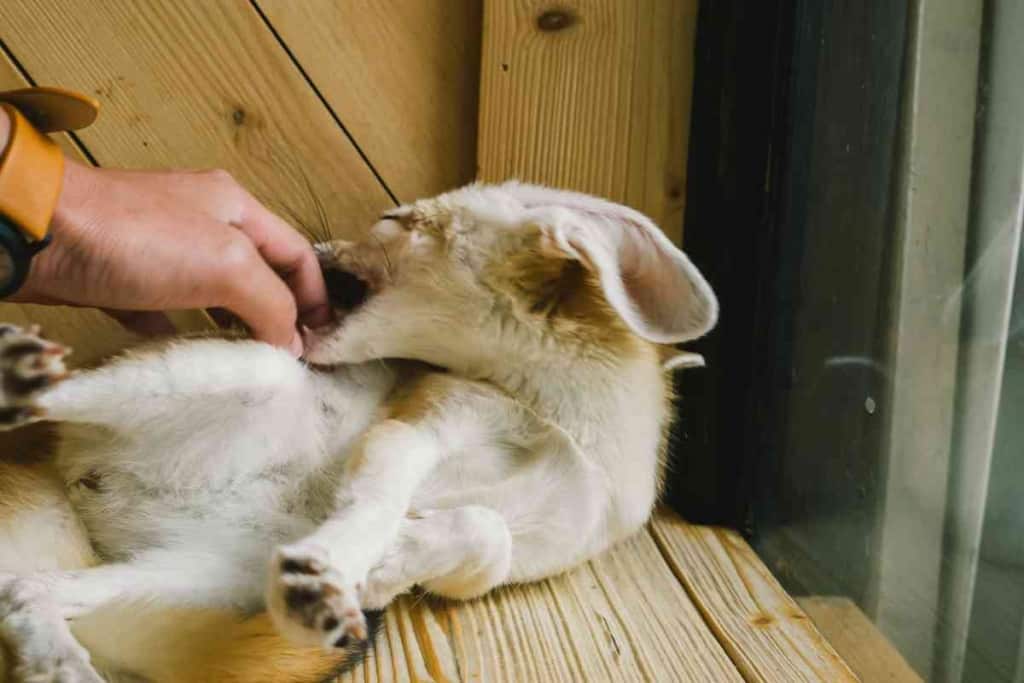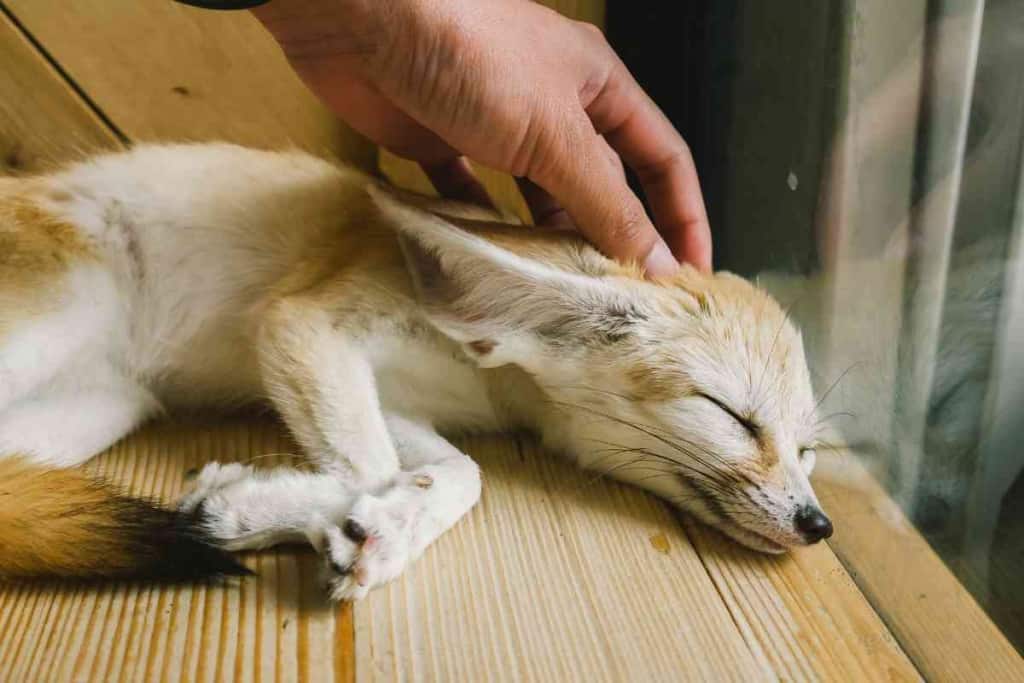Do Fennec Foxes Make Good Pets?
Fennec Foxes are an exotic breed of foxes. They are incredibly cute and cuddly animals, but do they make good pets?

Do Fennec Foxes Make Good Pets?
Fennec Foxes can be kept as pets, but they don’t make good pets. These little foxes hail from the Saharan desert. They are active and playful. However, they don’t like being handled. If touched, they can become nervous quite easily. This is why it’s not recommended to keep these animals as pets.
While it’s not something we recommend, you can keep a Fennec Fox as a pet. However, there are a number of things you must consider when taking care of these animals. We’ve dealt with Fennec Foxes in shelters before, and we’re going to use that experience to tell you all about them.
Things to Consider When Bringing Home a Fennec Fox
The Enclosure
Despite their cute and cuddly appearance, fennec foxes are still wild animals and should not be kept as indoor pets.
These animals have specific habitat requirements and have high amounts of energy to burn, so keeping them cooped up in a house is unfair to their physical and mental well-being.
To provide a suitable living environment, they need an outdoor enclosure that allows them to express their natural behaviors. This means they should have enough space to roam, play, and engage in digging behaviors.
Additionally, there should also be hiding places for them to seek shelter and escape from the elements. While having a pet fennec fox may seem exotic and trendy, potential owners must thoroughly research the animal’s needs before committing.
Providing an appropriate enclosure is just one of the many responsibilities of owning a fennec fox.
Their Food and Water Needs
As omnivores, fennec foxes can thrive on a varied diet that includes both meat and fruit. It’s important to note that their food must contain taurine to maintain their health.
This can easily be achieved by feeding them a mix of fresh meats and commercially-available dog food. In addition to their meat and fruit portions, a balanced diet for fennec foxes should also include insects, vegetables, and eggs.
As with any pet, it’s important to consult a veterinarian to ensure your fennec fox receives the proper nutrition for its specific needs.
Whether hunting for their own food or being provided with a varied diet from their owner, fennec foxes are adaptable eaters who can thrive on a combination of meats and fruits.
While it may seem surprising, fennec foxes do not require much water. In their natural desert habitat, they obtain most of their hydration from the prey they consume.
However, this doesn’t mean you shouldn’t provide your pet fennec fox with clean drinking water at all times. They may still choose to drink it, and it’s important to have a source of hydration available in case their diet isn’t providing enough moisture.
These charming little creatures have adapted to survive in harsh desert environments. However, as their domesticated owner, it’s still our responsibility to ensure access to necessary resources like water.
So while they may not drink as much as other pets, ensure your fennec fox always has access to fresh water.

Their Exercise Needs
As adorable as they may be, it’s important to remember that fennec foxes are not domestic animals and have unique needs as pets.
One of those needs is a sufficient amount of exercise and physical activity. If they do not get enough, they can become lethargic and develop unhealthy habits such as excessive grooming or overeating.
Providing them with opportunities for physical activity, such as runs in a safely enclosed outdoor space or enrichment activities within the home, can significantly benefit their well-being and behavior.
Plus, it’s just good for all pets to stay physically active! So if you’re considering adopting a fennec fox, make sure you understand the importance of providing them with ample exercise and are willing to commit to meeting their needs.
Some Facts About Fennec Foxes
It Is the Smallest Fox in the World
Did you know that the fennec fox, found primarily in the Sahara desert, is the smallest fox in the world?
These adorable creatures weigh less than three pounds and have disproportionately large ears that help them regulate body heat and hear small prey moving underground.
Their pale coats also serve a unique purpose – they allow fennec foxes to blend in with their sandy surroundings.
Beyond their physical adaptations, fennec foxes are also skilled hunters and foragers, preying on insects, small mammals, and fruit.
Unfortunately, these fascinating animals are threatened by habitat loss and hunting for their fur. Hopefully, increased education and conservation efforts will ensure that the charming fennec fox thrives for years to come.
They Live in a Pack of 10
Despite their tiny size, they have a surprising pack structure. While most fox species live as solitary individuals, fennec foxes live in packs of up to 10 individuals consisting of a breeding pair and their offspring.
These groups work together to hunt for small prey, such as insects and rodents and defend their territory from potential predators.
The pack will also use communal underground dens for refuge during the day, rotating between multiple dens to avoid overexposing one location to predators. So next time you see a fennec fox, remember that it’s likely not alone – it’s just part of a very small but close-knit family.
They Have Exceptionally Long Ears
Did you know that fennec foxes have the largest ears in proportion to the body size of any fox species?
These unusually large ears serve a specific purpose in their desert habitat – they amplify their hearing, allowing them to detect prey, such as insects and small mammals, that may be burrowing underground.
In fact, their sensitive hearing is so precise that they can locate their prey without even seeing it. Along with their efficient digging skills, their extraordinary hearing gives them an advantage in their harsh desert environment.
So next time you see a fennec fox, don’t just admire its cute appearance – take a moment to appreciate the adaptations that allow them to thrive in their natural habitat.
They Have Extra Fur on Their Feet
This distinctive feature serves the practical purpose of keeping the foxes cool in the hot desert climate they inhabit.
The thick fur not only insulates the fox’s feet from the hot sand but also helps to spread their weight, allowing them to walk on the hot surface without burning their paws.
In addition to serving as natural protection against the heat, the thick fur provides extra grip for the fox’s toes, making them agile and nimble climbers.
So the next time you see a fennec fox with big fluffy feet, remember that those tufts of fur serve an important purpose in the animal’s harsh desert environment.
They Are Very Loud Creatures
Fennec foxes are known for their huge ears and adorable faces, but they also have a reputation for being quite vocal.
In fact, they can often be heard chattering, yipping, barking, and even screaming at night. While some find this behavior charming or endearing, it can cause problems for homeowners or those living near wild fennec fox populations.
These animals communicate with each other constantly, making noise at all hours of the day and night. They also have a distinctive sound that carries far distances, making it difficult to contain their noisy behavior.
So if you’re considering owning a fennec fox as a pet, make sure you’re prepared for the potential noise they may bring.
Key Takeaways
- First, fennec foxes are highly intelligent and need constant stimulation and enrichment to prevent boredom. This can include hiding food for them to hunt, providing interaction through playtime, and giving them a sturdy enclosure with climbing materials.
- Secondly, fennec foxes have a high prey drive and should never be left unsupervised with small animals or pets.
- Thirdly, fennec foxes are sensitive to temperature extremes and may require air conditioning or heat during hot or cold weather.
- Finally, fennec foxes are exotic animals that may not be legal to own in certain areas; check your local laws before getting a fennec fox as a pet.
